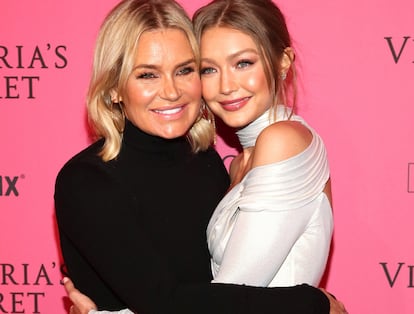Are you an almond mom? The fixation on healthy eating that can turn into fatphobia
An obsession with nutrition and the ideal body weight can cause a toxic relationship with food in children

The video, taken from a 2014 episode of Real Housewives of Beverly Hills, has been viewed millions of times. In it, a young Gigi Hadid tells her mother Yolanda, one of the stars of that reality show about the rich and famous: “I’m feeling really weak. I had, like, half an almond.” Yolanda, half numb from the anesthesia – she had just had her breast implants removed – simply replies: “Have a couple of almonds and chew them really well.”
Last October, that clip went viral because several TikTokers used it to create videos warning about the dangers of a kind of orthorexia, the unhealthy obsession with eating “pure” food. The clip sparked a new term: “almond mom,” which refers to mothers who talk about their children’s diet and weight, leading to fatphobia. A pediatrician named Dr. Karla who posts on TikTok as @imecommunity was among those who helped popularize the expression in a video where she stated: “This is a really concerning trend that I’m seeing as I coach parents and their teens, and it’s really harmful. This phenomenon of almond moms [has] been ongoing for a long time, rooted in diet culture, internalized bias, fatphobia, projection of fear, pursuit of thin privilege and not health.”
From that moment on, several users of the platform, mostly teenagers, reported having “almond moms” who would criticize them if they tried to eat too many carbohydrates and congratulated them whenever they lost weight. The matter has emerged as a generational affair, with many women who were raised in the 1980s – at the height of diet culture – admitting that they have a hard time not commenting on their own bodies in front of their children or managing their own, somewhat pathological relationship with food, while the younger ones denounce that tendency.
Virginia Sole-Smith is the author of the book Fat Talk: Parenting in the Age of Diet Culture, as well as the coordinator of the Burnt Toast newsletter and podcast, where she analyzes toxic matters surrounding food. She knows perfectly well what an almond mom is, partly because she has spent years interviewing them. However, she laments how it all became the genesis of a new, exclusively female evil archetype. A label like “almond mom” can help identify a phenomenon with a term that everyone understands, but she considers it a problematic one, mainly because it does not take almond dads into account. Sole-Smith thinks that it does make sense for people to talk about how women pass down diet culture to their children, as long as men are not left out of the conversation.
According to the author, what is now known as diet culture started in the 1990s, when a kind of war against obesity broke out. Along with the beauty ideals of thin celebrities, public health institutions started promoting the idea of losing weight as the only way to achieve health and happiness. Thus, being thin was no longer just about vanity; it became a matter of morality and social responsibility. For her book, she interviewed dozens of parents who grew up in that environment and even suffered ridicule for not conforming to the thin ideal.
One of the conclusions of her work is that this phenomenon tends to occur a lot among middle and upper-middle class families where it is common (and almost a symbol of status) to talk about the children not eating carbohydrates between meals, or how the closest they have ever come to eating a piece of candy is a five-raisin afternoon snack. Parents use these kinds of rules because they are afraid of the consequences of raising a fat child, explains Sole-Smith.
Instead of making rules, her recommendation is to let children find happiness in food and listen to their bodies regarding hunger and fullness, as well as talking less about what and how much children eat and just focusing on enjoying food, making each meal a safe and pleasant moment with enough to eat, so that the children leave the table happy and satisfied.
Sign up for our weekly newsletter to get more English-language news coverage from EL PAÍS USA Edition
Tu suscripción se está usando en otro dispositivo
¿Quieres añadir otro usuario a tu suscripción?
Si continúas leyendo en este dispositivo, no se podrá leer en el otro.
FlechaTu suscripción se está usando en otro dispositivo y solo puedes acceder a EL PAÍS desde un dispositivo a la vez.
Si quieres compartir tu cuenta, cambia tu suscripción a la modalidad Premium, así podrás añadir otro usuario. Cada uno accederá con su propia cuenta de email, lo que os permitirá personalizar vuestra experiencia en EL PAÍS.
¿Tienes una suscripción de empresa? Accede aquí para contratar más cuentas.
En el caso de no saber quién está usando tu cuenta, te recomendamos cambiar tu contraseña aquí.
Si decides continuar compartiendo tu cuenta, este mensaje se mostrará en tu dispositivo y en el de la otra persona que está usando tu cuenta de forma indefinida, afectando a tu experiencia de lectura. Puedes consultar aquí los términos y condiciones de la suscripción digital.








































